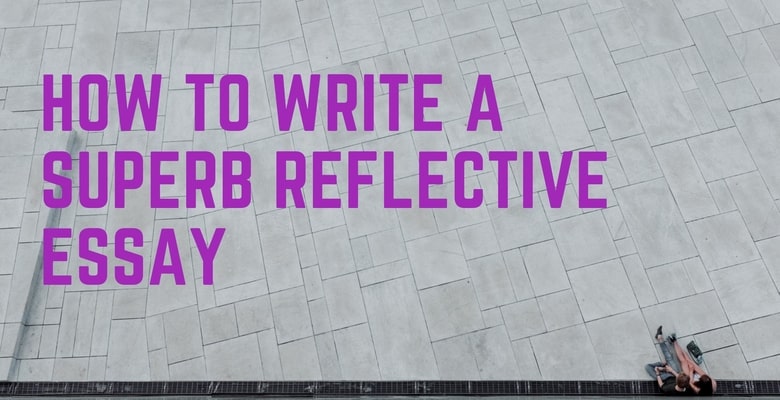How to Write a Superb Reflective Essay with Less Effort (+ Essay Sample)
When your professor asked you to write an argumentative essay, you were puzzled. But you had no problem exploring the topic and writing about it. When you get a reflective writing assignment, you get into a whole other area of academic writing. This is a personal project. You’re supposed to describe an experience that meant a lot to you.
So you start reading examples of reflective writing and most of them seem… pathetic. Almost every personal reflection example seems too personal and doesn’t trigger your interest to read it to the end. Professors feel like that, too. Most students don’t know how to write a personal reflection, so they deliver boring papers.
Yours is not going to be like that. We’ll give you great tips on how to write a reflective essay that grabs and holds the reader’s interest. Plus, we’ll give you an awesome reflective writing example essay by the end. It will give you more direction and inspiration.

What Is Reflective Writing?
Wikipedia gives a nice and clear definition for reflection writing: it’s a type of analytical writing, where the author describes a real or imaginary experience. It may be a memory, event, scene they witnessed, change they experienced, or even a thought they had.
Do you know what a great personal reflection example is? Marcel Proust’s In Search of Lost Time. This is a novel of six volumes. Its creation was triggered by a memory. One morning, the author had his tea. When he dipped a cookie in the tea and tasted it, a sudden flow of memories occurred. Proust remembered a moment of his childhood, which led to an entire chain of events up to his adulthood. I mean, the book is six volumes long.
That’s an impressive reflective writing example. But don’t worry; you don’t have to read the entire thing. You don’t need to write to that extent. Proust was one of the most talented writers in history, and you’re just a student. Your professor expects a simple essay. We’ll give you a nice reflective essay example at the end of this guide, so you’ll get an idea of what exactly you’re supposed to write.
Let’s make this clear.
Reflective writing is NOT:
- Your usual argumentative essay
- A problem solving or critical thinking assignment
- An essay based on a thesis statement
- An essay based on research
- Simple conveying of information
Reflective essay writing is:
- An essay that expresses what you learned or explored
- Your reaction to feelings and thoughts
- Your reaction to experiences, events, and opinions
- Personal writing that leaves a lot of space for creative expression
What’s the Purpose of Writing a Reflective Essay?
Read any reflective essay example and you’ll realize it’s a way for the author to delve deeper into their thoughts and emotions from a certain experience. That’s the purpose of reflections.
Psychotherapists often instruct their patients to engage in reflection writing. They call it journaling. This is an effective method that enables people to identify their feelings about something. They dig deep and express all emotions, fears, and thoughts. When they put all this on paper, it becomes easier for them to cope with the burden of life.
But your professors are not psychologists. They want you to learn how to write a personal reflection for other reasons:
- Reflections are part of personal growth. They help you see what you learned and how you grew throughout life. With this type of writing, you understand how you changed emotionally and you see yourself from a clearer perspective.
- Reflection is important for any career. Business people use it to analyze their career and understand where they want to see their projects in future. Social workers and psychologists use it to analyze their clients, as well as the environment that affects them. Teachers write about their experiences with students, and students write about their educational processes.
- When your teacher assigns a reflective assignment, they give you a chance to express yourself on the most personal level. As long as the essay is well-structured, you’ll probably get a good grade. They won’t judge you on the experiences. Just try to write well.
What’s the Reflection Essay Structure?
If you search for an example of reflective writing, you’ll find something like Proust’s novel. You may also find an essay by a professional writer, but it won’t have the structure of an academic essay. James Baldwin’s Notes of a Native Son is a collection of reflective essays. But that’s not an example you can use for academic writing.

When you write the paper for college, it needs a particular structure.
This is the basic reflective essay structure to follow:
- Introduction
Right from the beginning, you’ll identify the subject you’ll write about. You should convey your main point of view – what effect did this experience have on you? The reflective paper doesn’t usually need a rigid thesis statement. But the focal point of your paper should definitely be presented by the end of the intro.
- Three body paragraphs
In these paragraphs, you’ll write three reasons why the matter affected you the way it did. Each paragraph should start with its own topic sentence that’s connected to the main point. In this aspect, the reflective paper is very similar to your typical 5-paragraph essay.
- Conclusion
Your final thoughts should be very powerful. Think of this as an ending of a great novel. You want the final part to stick with the reader for a long time.
Tips on How to Write a Reflective Essay
- Choose a Good Topic
If you’re wondering how to start a reflection, the topic is crucial. This is a type of paper that doesn’t start with a research process. In fact, you don’t need to conduct research. You have the information within you. Here are few topics that might work:
- A fantasy you had
- A place you visited
- Some real experience that changed you
- Something you smelled, saw, or felt
- Your feelings about the desert, countryside, or the ocean
- The way your dog changed you
- An important conversation you had with an important person
- A turning point of your life (such as the college application process for example)
- A dream
- Your favorite song
- A boyfriend/girlfriend who hurt you
You see? There’s a lot to write about.
The topic may be very personal, so you should decide how much you’re willing to expose yourself. After all, you should keep in mind that your professor is going to read this.
- Brainstorm
Brainstorming is a great technique that gives you a foundation for the essay. Take a piece of paper and write whatever comes to your mind. Just think about the topic you chose and write all thoughts that appear. Try to follow the flow of your thoughts without provoking or stopping them. Just let them flow and you’ll get great ideas.
When you’re done with the brainstorming, you’ll just need to organize these impressions into an outline. At this point, you’ll follow the essay structure we suggested above. Plan what you’ll write in the reflective essay introduction, body, and conclusion.
- Answer few Questions
When you start writing the essay, make sure it answers some of these questions:
- How did you feel about this experience?
- Why did the matter make you feel that way?
- How did this experience change you?
- Why was it a turning point in your life?
- What did you learn from all this?
- What if it never happened?

Remember: it’s a reflection.
Read a Good Reflective Essay Sample
All those tips on how to write reflection are really useful. Still, you could use a reflective essay sample that shows how those tips are implemented in a paper.
We have a great sample for you.
How Memories and Life Experiences Made Me What I Am
This morning, I was struck by a wave of nostalgia. I looked through the yellowy photos of my ancestors, many of which are no longer among us. I see a town that looks differently: empty spaces on the site of some current buildings, houses that look nothing like today, and motorbikes that remind me of Nazi films. I see ships that are no longer parked at the harbor, and guitar gigs that are no longer a source of entertainment. The memory lane carried me on. I remembered some comfortable jeans I bought at a discount. I remembered how my friends and I made our own lake in the yard, and I remember the caterpillar I secretly kept in a box of my mom’s face cream. These memories, which are part of mine and other people’s lives, shaped the person that I am today.
It’s strange that whenever I start remembering things, there is one particular scene that comes to the surface: I was some four or five years old and I was very sad… for I reason I can’t exactly remember. I was sitting in the living room, drinking a cup of cocoa. And I remember thinking: “The cocoa is really nice and I like it. I don’t need to be sad.” In that moment, I realized that I was the greatest consolation of my own. Throughout my entire life, it remained so. I learned how to keep my strength for others and never show how their personal difficulties affected me, too. Even talking about myself became a rarity, and so did personal reflection. I became a closed book. Some thought I was a mysterious introvert, but deep inside, I felt like a simple, average person with nothing exciting to share. Those who think they know me would be disappointed by the true me vs. the projected me. It’s easier for me to deal with melancholy, anger, and all other villains from the emotional palette than with indifference – the most devastating feeling that defined my life.
From today’s point of view, I know I wasn’t a favorite among my classmates. I never felt self-assured and I never thought I was something special, even though I was always a subject of teachers’ praise. I was always quiet and looked… indifferent. I looked like I didn’t care about anything, but I was going through an inner battle for a long time: was it better for me to be a conformist or must I strive to stand out in any way possible? Society told me to stand out. I was supposed to mold myself into something diametrically opposed to my character. If I accepted that, wouldn’t it make me a conformist? It was at this time when I made an unbreakable pact with books. They were not my shelter or my getaway. They were my home. Throughout my adolescence, Richard Bach and J. D. Salinger gave me the comfort I needed.
As many others I buried my dreams and remained an eternally unrealized writer, athlete, painter, lover, and person. Society pushed me to be all that, to a point when i felt like I had no other choice but to stand out. When I realized I couldn’t be the best in anything, I finally used my right to free will and I backed off. I believe that the biggest lie of modern civilization is that humans are the peak of evolution. With so many limitations and minimalistic prospects of self-realization, do we really stand at the peak? When looking at the photos of my ancestors, I feel like they are nothing but statistics. I remember them, but the world doesn’t. Each of them is just a randomly chosen name and few dates. They all knew they could do more, but their unrealized dreams and ruined ideals were crumbling day by day, like a piece of stale bread. How much of themselves did they lose throughout life? How much did I lose?
It’s hard to go down the memory lane. To me, it’s the hardest thing I ever do. I realize that growing older is not about the treacherous wrinkles in the corners of the eyes. It’s about looking at the mirror and seeing all lost battles of heart and life, in those deep, tired eyes. It’s about understanding that when the cautious view of maturity and distrust towards the rest of the world replaced the childish naivety you once had, you gave up on yourself. But then I go back to my childhood roots and I realize that deep within, that child is still alive. It tries to sleep open, but I catch her awake and she brings a smile in my eyes. There’s no sight more beautiful than the eyes that laugh at the world. If there is reincarnation, I wish I can choose to be born as a caterpillar in my next life. Then, at least, I’ll have a chance to become a butterfly one day.